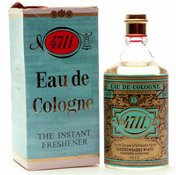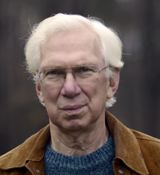Lightyears Collection
4711 Eau de Cologne
1792 (???)
Mülhens
Click on image to enlarge 4711 Eau de Cologne |
The History
The twisted history of 4711 eau de cologne dates back to the 18th century when Johann Maria Farina (1685-1766) relocated from Italy to Cologne where he began to manufacture and sell an "eau de cologne" that acquired a wide reputation.
In 1803 Wilhelm Mülhens, desiring to capitalize on the fame of Farina's product, obtained the rights to the "Farina" name from Carlo Francesco Farina, a Farina with no connection to the Johann Maria Farina family.
Mülhens opened his own factory in Cologne and produced his own eau de cologne using the "Farina" name. He also "licensed" the name and the right to produce his product to at least twenty other people. In 1835 as a result of a legal action, all of the licenses were voided and all of the businesses closed.
At this point, Mülhens' son went to Italy, found another Farina, and again established a company under the "Farina" name. This again led to legal actions and in 1881, Wilhelm Mulhen's grandson, Fredinand Mülhens, adopted the "4711" name for both the company and their product after the company was barred from every using the "Farina" name again. The "4711" name had been registered as a trademark in 1845 and was derived from the building number that had been assigned to the Mülhens' Glockengasse building in 1796 by Daurier, the French commander of the occupying forces. The original 4711 Glockengasse building fell victim to urban renewal and and no longer exists.
In 1994 the Mülhens family sold the company to hair care giant, Wella. In 2003 Wella was acquired by Procter & Gamble. In 2006 Procter & Gamble, citing a declining market for the 4711, sold the brand rights and "the famous Glockengasse building" to Mäurer & Wirtz, an independent subsidiary of the Dalli Group.
The Product
4711 eau de cologne was traditionally produced largely from citrus oils, rosemary, lavender, alcohol and water. While its popularity dates back over 200 years, 20th century innovations in perfumery have rendered the formula dated and, while at one time it was particularly popular in Germany and the U.K., today it find favor mostly with an older generation that grew up accustomed to its aroma.
While the "secret formula" is produced in Cologne, Germany, for the export market the product is "finished" locally. Thus a bottle sold in the U.K. would be "finished" in the U.K., using fragrance compound supplied by Cologne. The "finishing" no doubt would involve the addition of alcohol and water plus the filling and packaging.
The Legend
Company legend has it that in 1792 the young Wilhelm Mülhens received a secret recipe for "aqua mirabilis" from a Carthusian monk as a wedding gift. Shortly thereafter Mülhens set up a small factory in Cologne's Glockengasse 4711 and began to manufacture the brew. The house number became the company's trademark.
In the 18th century, 4711 was marketed for its medicinal qualities but in 1810, a Napoleonic decree required that all medicines disclose their ingredients. Rather than allow disclosure of the secret 4711 formula, the product was re-marketed as a toilet water for which no disclosures were required. As a toilet water, the product flourished.
The legend appears to be a bit at odds with the family's "Farina" disputes.
Sources
Sources for this article include Wikipedia's most interesting presentation along with other miscellaneous sources including 4711 packaging and the 4711 website.
|
If you have any comments you would like to add about 4711 or Mülhens, please share them with us using the message sender below. |
|


Philip Goutell
Lightyears, Inc.

